With the World Wide Web’s flexibility mapping every idea, business, and hobby on the internet, the need for a website has become mandatory. A website is a remote mirror that gives both perspective and access to what the world offers. Purchasing a website creation service is one thing and having the ability to create one is another thing.
Therefore we should commence this article on a fun note because the knowledge it is about to offer is not easily dismissed. How about a knock-knock joke?
Knock knock
Who is there?
CMS
CMS who?
CMS Website Creation Tools
Before we wonder about the open-source CMS platforms that will end our pursuit of ideal web creation tools, we first need to define its naming convention. CMS is an abbreviation for a Content Management System. It focuses on creating a website with a balance of configuration and writing code. It implies you do not have to invest entirely in writing code for your website for it to be up and running. However, there are some CMS that will not force you to write any code. It all depends on how you want to flex your web creation pursuit. You can choose to master a CMS tool that hides all the code from your eyes, one that partially exposes you to some code or one that lets you play with all the code snippets you want.
The CMS options at our disposal cannot be exhausted, and that is why we only need to go with the select few that we think will be ideal for your web creation hobby or career. The article also seeks to expound on the metrics to consider before going with a certain CMS web creation tool.
Technical Definition of a CMS Platform
A Content Management Platform or CMS is like any other software because they have the objective of lessening the amount of time and effort needed to accomplish a task. In this case, a CMS lessens the efforts and input needed to create a website and manage its content.
The SI units or skeletons that define any normal web page or website are HTML, CSS, and JavaScript. These programming languages are the standards that define the general layout of a website. Therefore, if you were to dismiss the usefulness of a CMS, your web creation journey would imply that you have to learn HTML, CSS, and JavaScript separately, and this approach is not an easy feat. You will have to invest lots of time and resources to perfect your learning curve when you could be mastering how to set up and use a CMS in under a week.
CMS also brings to the table the aspect of codeless learning. Therefore, website creation does not have to be a domain conquered by individuals with technical backgrounds. The only exception that will force some coding background requirement is when you quest to be a CMS developer. It will imply that you want to code your own plugins or improve on the open-source CMS already in place.
How to Choose Between Open-Source CMS Platforms
The number of CMS platforms currently at our disposal makes it a little bit complicated to select the one that will meet our objective needs. It has literally become the needle in the haystack scenario. Therefore some little hacks into the personality and presentation of these CMS will save us from unwanted headaches. Consider the following traits of a good CMS before engaging with your web creation tool of choice.
Ease of Use
Just because a website creation tool is called a CMS does not imply that it should give you the notion of a complex learning curve. Your ability to create and edit content through it should be flawless. Therefore an ideal feature for this trait would be the drag and drop interface. This feature will save you lots of time when your website or web page needs the addition of new and improved elements. Moreover, after you are done creating the needed web elements, and your site goes live, you might need to make other useful corrections, adjustments, or updates. Dealing with such a feature will make your work easy and straightforward.
Design Options
The only thing that can make a website design option standout is the availability of numerous web design templates. This trait should be a non-negotiable option for any CMS user. A template is a fusion of HTML, CSS, and JavaScript and their availability gives your website the structure it needs. If you have plenty of templates to work with, then customizing your website designs to meet specific design criteria will be a walk in the park. This customization should not cost you too many scripts of code. The ideal approach should be for the CMS to optionally let you customize your site under development with direct code or no code at all.
Data Portability
A website without data does not add much to your website creation objective. Your CMS should give you the complete package. Therefore, it should support both web creation and web development. Web development requires that the CMS you are using supports the use and configuration of different database backends. These databases enable you to import and export data. Therefore the data you create and use can be in different forms. An instance where the usefulness of data portability is priceless is when you want to change the hosting company for your already created site. You will want to safeguard your data before you complete the hosting company migration.
Extensions and Addons
All websites can never be the same in the functionalities and features they deliver. Therefore, you will never come across a CMS platform that considers itself as the complete package. However, this mentioned instance is not a permanent disadvantage as extensions and add-ons solve this problem. They are independent applications and software that help fix or add the missing piece to a CMS web creation tool. The web browser you are using right now has the viability of extensions and add-ons that give you features and functionalities a normal web browser would be incapable of delivering. Therefore, the CMS you use should have room for installing and configuring extensions and addons. You can think of extensions and addons as CMS apps that extend something or add something to the functionality and performance of your web site project.
Help and Support Options
Even though a CMS has the main objective of lessening your web design and creation pursuit, the excitement of being a web design and development enthusiast will always keep you questioning everything. Therefore, you will need answers to these random questions that will pop into your mind. A CMS with help and support options reduces these stuck of questions from building up in your mind. However, this feature’s availability is not a guarantee that you will get the quality of service you desire. Some CMS with FAQs and Customer Service features will delay your questions’ urgency, while others will be prompt to your queries. Therefore, look for online reviews regarding how the FAQs and Customer Service features of the CMS you choose perform.
CMS Cost
Despite most CMS being free, you might incur some cost or subscription fees in circumstances that require some high performing third-party extensions, exceptional template designs and hosting services tied to your completed web project. Therefore, the choice of a CMS might be free at first, but the services that follow afterward after the completion of your project are the ones that might stretch your spending. Therefore, you should do your homework and find out if you will be comfortable with the set fixed prices or subscription fees that will follow.
The Best Website Creation Tools (Open Source CMS)
Now that you understand the baby steps needed to make your CMS life happy, it is time to dive into the deep waters and list the CMS platforms that will make your web design and development pursuit as comfortable as possible.
1. WordPress.org
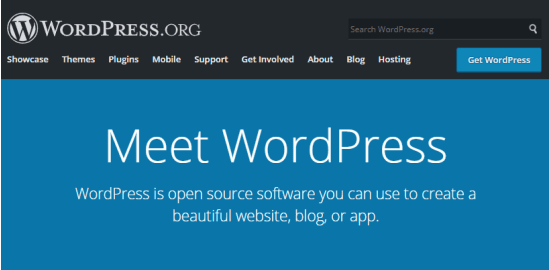
WordPress CMS
If there is a CMS out there that outranks and outperforms all the other CMS in terms of popularity and functional stability, it must be the Wordpress.org CMS. Apart from its top popularity ranking in the World Wide Web, it is also responsible for 35% of the Internet’s websites. However, we should be careful not to misquote WordPress.org with WordPress.com. They are birds of the same feathers, but they do not flock together. The history of WordPress.org continues to flex its muscles. It was originally purposed to be an open-source CMS for blog design and development. However, the efficiency and proficiency it presented made it an adaptable candidate to e-commerce platforms and other types of websites. Therefore, this platform is different from WordPress.com, whose main functionality facilitates a hosting platform for blog sites. WordPress.com is also an ideal web hosting option once you are finished with your CMS web project via this CMS platform.
Pros
- Whether you want to build an auction site, an online store, or a membership site, this CMS will give you the needed flexibility and functionality to attain your web creation objective.
- You do not require any prior coding knowledge or technical skills to benefit from its features. For example, the WordPress Block Editor has a priceless contribution to your site’s pages’ design layouts.
- With a great open-source platform comes great freedom. You can choose to use your created site as you want without being answerable to anyone.
- The abundance of available WordPress Plugins and themes is underrated. You won’t have to deal with any missing pieces in the CMS as these paid, and free themes and plugins will be the solution to your worries. Therefore, tasks like adding a contact form or implementing awesome photo galleries should not force you to re-invent the wheel.
- The design of this CMS puts a lot of consideration into SEO (Search Engine Optimization). Coming up with categories, SEO-friendly URLs, and tags to use in your posts does not require an algorithmic code. Moreover, there are plenty of SEO plugins that quickly help you sort your SEO issues.
- The WordPress community is impressive. The support it offers regarding the issues these open-source CMS faces are both practical and efficient. There are numerous WordPress groups for both beginners and advanced users ready to facilitate a solution to any CMS challenge you might face.
- This CMS is extensible, a fact that makes it adaptable for both beginners and advanced users or developers. Therefore, it will adapt to your web creation level and experience and scale with you if your skillset grows.
- All the content you create under a WordPress.org CMS platform is downloadable in an XML format. It implies that WordPress.org does not hold you hostage in its environs. Therefore, if you seek to consider another CMS system or platform in the future, you can comfortably make your migration alongside the previously created data.
Cons
- The CMS will sort you out until you perfect your web creation and development exploits. However, setting up your domain name and hosting platform are your sole responsibility, alongside initiating the needed backup management features and site security configurations.
- The numerous free features and options presented by WordPress CMS make it flexible, which is exciting at first. However, to a beginner who is yet to master the CMS, things might not be as smooth as predicted. Therefore, a drag and drop plugin should be sufficient at first.
Pricing
This WordPress CMS should not cost you anything. The only costs to incur are the yearly subscription fees for the domain names you will use and the hosting account to enable your web project to go live on the internet. It would help if you did your homework on the domain name and hosting account offers to make a pick on one that favors your budget.
2. Joomla
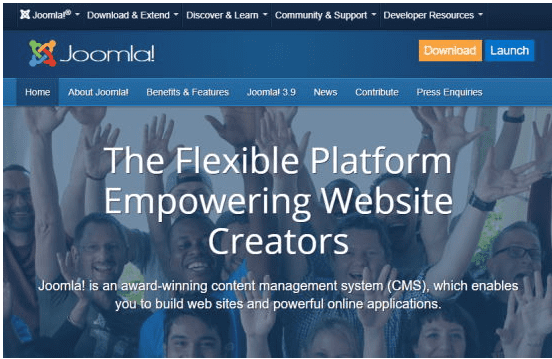
Joomla CMS
The next item on the popular open-source, free CMS list is Joomla. Its popularity is also a result of the numerous extensions and plugins that are at its disposal. Your choice of consideration for this CMS will not come with a price tag. However, as for the domain name and hosting account subscriptions, you will have to make a budget decision. Since it is two years younger than WordPress, its birth year, 2005, implies that it has had sufficient time to grow, develop, and be stable. This CMS is rich in terms of the features it offers. Most hosting companies are taking advantage of its popularity in the web creation market and, in turn, offer a one-click installation for those seeking to take their projects to live on the internet. However, web creators with some background experience and mature developers will find this CMS adaptable. Therefore, a beginner will need some web creation mentorship to adapt to and conquer this platform fully.
Pros
- This CMS has plenty of options and numerous flexible features to consider. Therefore, if the web creation project you are working on can be described as bespoke or somewhat complex, Joomla is the answer to your web design and development project approaches.
- The design spectrum of Joomla makes it ideal for mature developers. However, this fact does not rule out other interested users based on their minute coding experience. Joomla, too considers the users that do not want to take the coding approach. It makes content editing easy.
- You can take the community-driven approach to learn and master Joomla since its community support will get you through any web creation and development traffic.
- You can go full scale with Joomla and easily launch and complete a complex project like building an e-commerce store. It is because of the readily available extensions that will set this up.
Cons
- Using Joomla is not a complete walk in the park, and the Joomla fans club will confirm this statement. However, it will depend on your project’s complexity, and you might sometimes need the input and insight of an experienced developer to get your web project running.
- The availability of useful and unique extension options is not as prominent as it is in WordPress CMS. Therefore, if the project you are working on is too complex, extending its core functionality might be a limitation problem.
- If you work with different installed modules and extensions, you might run into compatibility issues and be forced to fix some bothersome project conflicts.
Pricing
Despite the open-source nature and community support under Joomla, you will have to incur costs related to subscribing to a web hosting account and purchasing a domain name. Moreover, some extensions you will come across are too good to be free. Therefore, you will have to pay a fee related to the services they offer.
3. Drupal
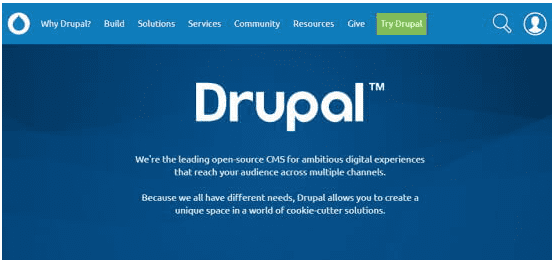
Drupal CMS
This CMS is another entrant in the open-source list of web creation tools. Drupal has already made a name for itself by creating and developing famous web applications like The Economist website. Additionally, many university websites have taken the Drupal approach to market and created their online presence.
If you are a developer, you will seamlessly sync with this CMS. However, if you do not want to interact with code, but your liking for Drupal refuses to fade away, you can consider an experienced developer’s services through this platform. Drupal is an ideal CMS if the objective is to create a website that handles plenty of data or requires lots of customization.
Some hosting services that favor this CMS offer free installation and migration of your Drupal site project to its domain.
4. Ghost
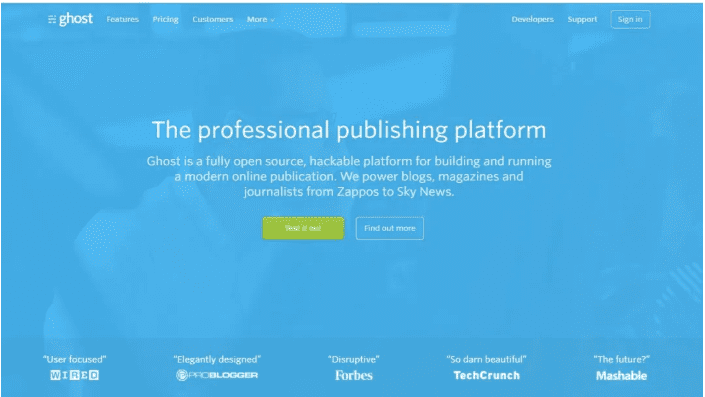
Ghost CMS
If you are looking for a CMS that resembles WordPress, then the answer is Ghost. The primary functional objective of this CMS is perfecting its delivery on content structure and SEO. Ghost seeks to give its users the best user experience and want the published user content to be best-polished. Therefore, its tailoring does not prioritize the need for extra features.
This CMS gives you a modern website design that adapts to the content you seek to publish. Moreover, if you have a completed blog site that needs some aspect of monetization, Ghost offers a subscription-based system. A Linux server or a managed hosting platform will handle the installation and configuration of your Ghost site. Such host services may provide a Ghost team to cater for data backups and security management while your focus is redirected to creating the content you want. It is simple, modern, and secure.
5. TYPO3
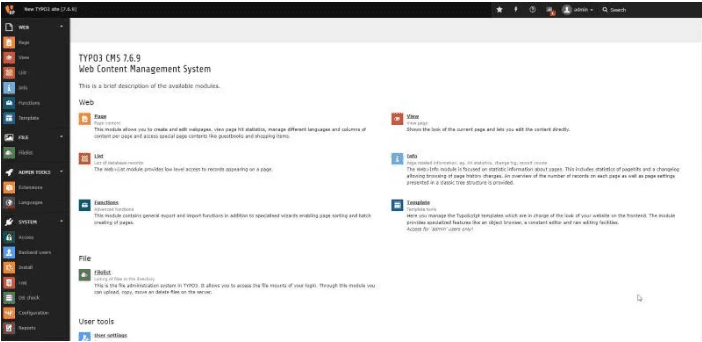
TYPO3 CMS
This CMS has a unique proposal for all the users that seek to benefit from its platform. Typo3 disregards the need for a modern UI element. It’s easy-to-use interface perfectly optimizes the creation and management of enterprise web landing pages. However, the lack of flexibility in its UI and support for additional features makes it less ideal for bloggers. A business web page, however, perfectly fits with this CMS. It is good for content that does not require too much maintenance or updates.
6. Magento
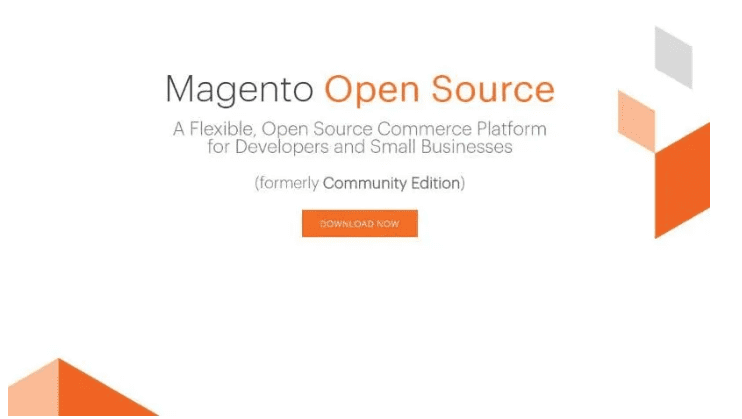
Magento CMS
The popularity of this open-source Magento CMS platform is because of its adaptability to e-commerce businesses. This CMS is packaged with two hosting alternatives. You can either host your completed project yourself if you are using the open-source edition or go with the hosted solution. The open-source edition is the community edition version of this CMS. This edition will give you the necessary functionalities to get started on your e-commerce site or web blog project. It is not beginner-friendly, but once you grasp it, you will have plenty of options to explore.
7. Microweber
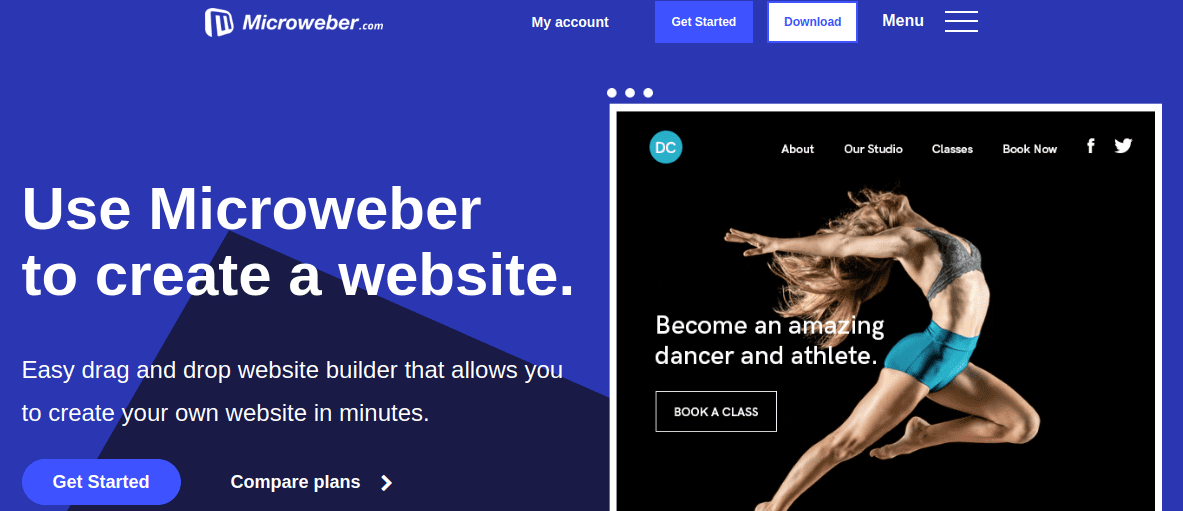
Microweber CMS
The Microweber CMS is easy to handle and maneuver around its structural layout. It takes minimal time to create and manage content. Microweber gives a chance to e-commerce integration, but the features that come along with it are not in plenty. However, the modern website design templates it offers are sufficient. It is easy to use, and you won’t struggle to manage your content. The CMS marketplace, however, does not give it the deserved round of applause. Therefore, its community support might be limited.
8. PyroCMS
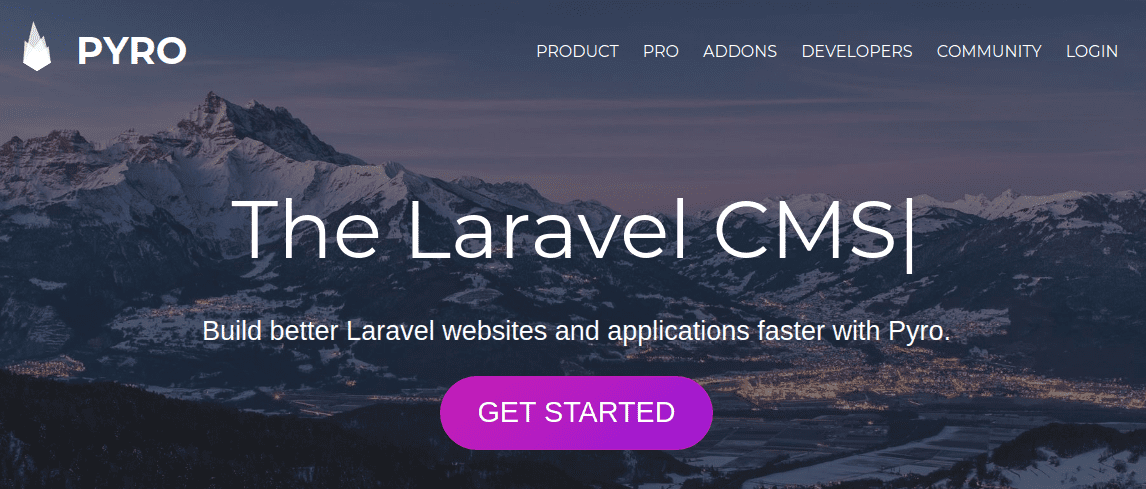
PyroCMS Web Creation tool
PyroCMS is still making a name for itself since its recent launch in 2015. This tool quests to reduce the number of steps needed to finish a web design project. Therefore, it targets speed and simplicity in web creation. Moreover, it offers several modules to flex your website’s functionality. However, it is not the go-to CMS for a fully-fledged site. It promises simplicity and elegance in the blog sites you will create. Its maintenance is moderate with limited extensions or customization.
9. Concrete5
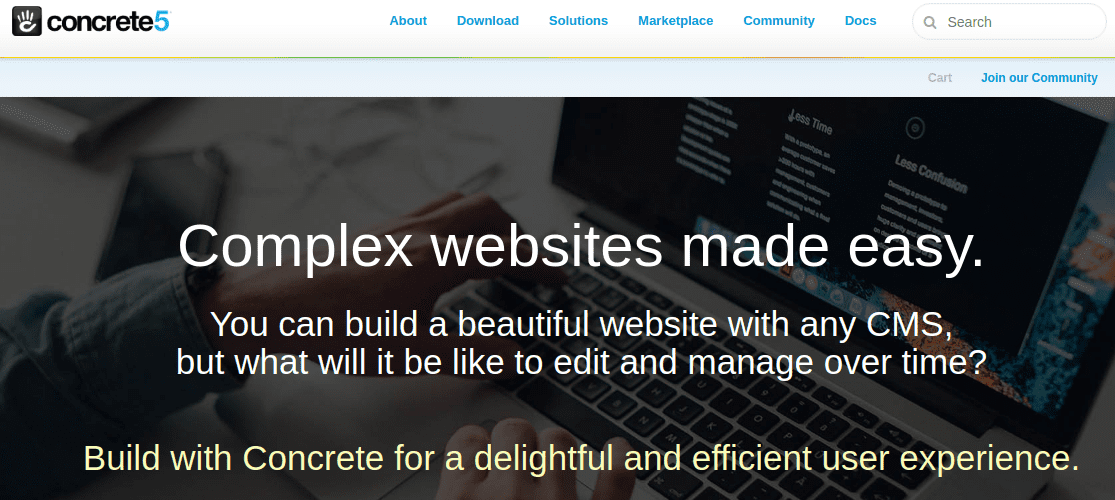
Concrete5 CMS
If you are looking for a content publisher that best fits the World Wide Web or the Intranet portals, you should consider Concrete5 CMS. It adheres to the Model-View-Controller architecture but does not require a user to have any super techy skills to adapt to its web creation platform. It offers in-context editing making it easy for you to edit your published content from the displaying web page. It supports add-ons, one-click version updates, and the installation of other useful features.
10. Django CMS
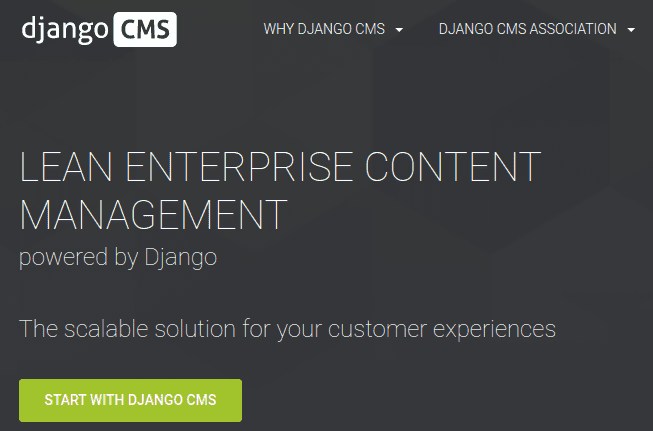
Django CMS
Django CMS is the tenth candidate on this list, not because it is the best spot it could get but because it had to get its deserved recognition. It would have been on the leader board with WordPress, but its complexity in installation and configuration might not be an ideal recommendation for a beginner. Moreover, it requires a user to have a solid background in coding in Python. It is rich with features such a front-end editing, flexible plugin architecture, and an outstanding editorial workflow when you need to publish or approve edited content.
Final Note
Your choice for a CMS should depend on your current website creation objectives and how fast you can meet them. The CMS should give you your deserved modularity or flexibility. It should also determine whether you want to write some code or use the already created features. Community support for the CMS is also essential as it will help you get back on your feet once you get stuck in the mud.


1 comment
For those who are in locations with slow and/or patchy internet, web-based CMS systems are a pain.
Pages drop, loads fail.
getpublii.com provides a fairly simple desktop app for Linux (and Windows and Mac) that lets website builders build their site on the desktop, then upload via simple sync.
Yes, there are a couple of fiddling bits pointing an existing site at your hosting provider, but using the inbuilt Netlify etc options again makes this fairly simple.
For those looking for a simple, static site that will not be changing that much, e.g. a small news site, Publii is perfect. If builders are looking at an e-commerce site then this might not be complex enough. But well worth a look.